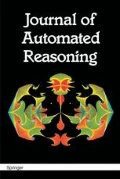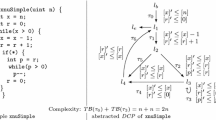Abstract
The MetaCoq project aims to provide a certified meta-programming environment in Coq. It builds on Template-Coq, a plugin for Coq originally implemented by Malecha (Extensible proof engineering in intensional type theory, Harvard University, http://gmalecha.github.io/publication/2015/02/01/extensible-proof-engineering-in-intensional-type-theory.html, 2014), which provided a reifier for Coq terms and global declarations, as represented in the Coq kernel, as well as a denotation command. Recently, it was used in the CertiCoq certified compiler project (Anand et al., in: CoqPL, Paris, France, http://conf.researchr.org/event/CoqPL-2017/main-certicoq-a-verified-compiler-for-coq, 2017), as its front-end language, to derive parametricity properties (Anand and Morrisett, in: CoqPL’18, Los Angeles, CA, USA, 2018). However, the syntax lacked semantics, be it typing semantics or operational semantics, which should reflect, as formal specifications in Coq, the semantics of Coq ’s type theory itself. The tool was also rather bare bones, providing only rudimentary quoting and unquoting commands. We generalize it to handle the entire polymorphic calculus of cumulative inductive constructions, as implemented by Coq, including the kernel’s declaration structures for definitions and inductives, and implement a monad for general manipulation of Coq ’s logical environment. We demonstrate how this setup allows Coq users to define many kinds of general purpose plugins, whose correctness can be readily proved in the system itself, and that can be run efficiently after extraction. We give a few examples of implemented plugins, including a parametricity translation and a certified extraction to call-by-value \(\lambda \)-calculus. We also advocate the use of MetaCoq as a foundation for higher-level tools.





Similar content being viewed by others
Notes
An upcoming extension of Coq [7] with such features could address this mismatch.
Note that we use a context of arities and de Bruijn indices to refer to the inductive types because they are not yet defined in the current global environment.
See https://coq.github.io/doc/master/stdlib/Coq.Logic.Hurkens.html for details.
In Coq a proof obligation is a goal which has to be solved to complete a definition. Obligations were introduced by Sozeau [42] in the Program mode.
The tactic defined in Coq is slightly more general as it allows to consider arbitrary non-propositional formulae as black boxes but this is rather a matter of instrumentation as it just amounts to some abstraction before applying the tactic.
One exception is with
 which requires recursion that cannot be proved well-founded in order to implement it inside Coq.
which requires recursion that cannot be proved well-founded in order to implement it inside Coq.This is inspired by lenses in Haskell: http://lens.github.io.
References
Abel, A., Öhman, J., Vezzosi, A.: Decidability of conversion for type theory in type theory. PACMPL 2(POPL), 23:1–23:29 (2018). https://doi.org/10.1145/3158111
Altenkirch, T., Kaposi, A.: Type theory in type theory using quotient inductive types. In: POPL’16, pp. 18–29, ACM, New York, NY, USA (2016) https://doi.org/10.1145/2837614.2837638
Anand, A., Morrisett, G.: Revisiting parametricity: inductives and uniformity of propositions. In: CoqPL’18. Los Angeles, CA, USA (2018)
Anand, A., Appel, A., Morrisett, G., Paraskevopoulou, Z., Pollack, R., Belanger, O.S., Sozeau, M., Weaver, M.: CertiCoq: a verified compiler for Coq. In: CoqPL. Paris, France. http://conf.researchr.org/event/CoqPL-2017/main-certicoq-a-verified-compiler-for-coq (2017)
Anand, A., Boulier, S., Cohen, C., Sozeau, M., Tabareau, N.: Towards certified meta-programming with typed template-Coq. In: ITP 2018—9th Conference on Interactive Theorem Proving. LNCS, vol. 10895, pp. 20–39. Springer, Oxford, United Kingdom (2018) https://doi.org/10.1007/978-3-319-94821-8_2, https://hal.archives-ouvertes.fr/hal-01809681
Annenkov, D., Spitters, B.: Towards a smart contract verification framework in coq. CoRR abs/1907.10674. arXiv:1907.10674 (2019)
Armand, M., Grégoire, B., Spiwack, A., Théry, L.: Extending Coq with imperative features and its application to SAT verification. In: Kaufmann, M., Paulson, L.C., (eds.) Interactive Theorem Proving, pp. 83–98. Springer (2010)
Avigad, J., Mahboubi, A.: Interactive theorem proving. In: 9th International Conference, ITP 2018, Held as Part of the Federated Logic Conference, FloC 2018, Oxford, UK, July 9–12, 2018, Proceedings. Lecture Notes in Computer Science, vol. 10895. Springer (2018). https://doi.org/10.1007/978-3-319-94821-8
Barras, B.: Auto-validation d’un système de preuves avec familles inductives. Thèse de doctorat, Université Paris 7. http://pauillac.inria.fr/~barras/publi/these_barras.ps.gz (1999)
Bernardy, J.P., Jansson, P., Paterson, R.: Proofs for free: parametricity for dependent types. J. Funct. Program. 22(2), 107–152 (2012)
Boespflug, M., Dénès, M., Grégoire, B.: Full reduction at full throttle. In: International Conference on Certified Programs and Proofs, pp. 362–377. Springer (2011)
Boulier, S., Pédrot, P.M., Tabareau, N.: The next 700 syntactical models of type theory. In: CPP’17, pp. 182–194. ACM, Paris, France (2017)
Carette, J., Farmer, W.M., Laskowski, P.: HOL light QE. In: Avigad, Mahboubi (eds.) International Conference on Interactive Theorem Proving, pp. 215–234 (2018). https://doi.org/10.1007/978-3-319-94821-8_13
Chapman, J.: Type theory should eat itself. Electron. Notes Theor. Comput. Sci. 228, 21–36 (2009). https://doi.org/10.1016/j.entcs.2008.12.114
Chlipala, A.: Certified Programming with Dependent Types. MIT Press, Cambridge (2011)
Christiansen, D., Brady, E.: Elaborator reflection: extending Idris in Idris. In: ICFP’16, p. 284 (2016)
Cormen, T.H., Leiserson, C.E., Rivest, R.L., Stein, C.: Introduction to algorithms. MIT Press, Cambridge (2009)
Devriese, D., Piessens, F.: Typed syntactic meta-programming. In: Proceedings of the 18th ACM SIGPLAN International Conference on Functional Programming, ACM, ICFP’13 (2013). https://doi.org/10.1145/2500365.2500575
Ebner, G., Ullrich, S., Roesch, J., Avigad, J., de Moura, L.: A metaprogramming framework for formal verification. In: Proceedings of the 22st ACM SIGPLAN Conference on Functional Programming (ICFP 2017), pp. 34:1–34:29. ACM Press, Oxford, UK (2017)
Feferman, S.: Typical Ambiguity: Trying to Have Your Cake and Eat it Too, Invited Lecture for the Conference, One Hundred Years of Russell’s Paradox (2001)
Forster, Y., Kunze, F.: Verified Extraction from Coq to a Lambda-calculus. In: Coq Workshop 2016. https://www.ps.uni-saarland.de/~forster/coq-workshop-16/abstract-coq-ws-16.pdf (2016)
Forster, Y., Kunze, F.: A certifying extraction with time bounds from Coq to call-by-value Lambda calculus. In: Harrison, J., O’Leary, J., Tolmach, A. (eds.) 10th International Conference on Interactive Theorem Proving (ITP 2019), Schloss Dagstuhl–Leibniz-Zentrum fuer Informatik, Dagstuhl, Germany, Leibniz International Proceedings in Informatics (LIPIcs), vol. 141, pp. 17:1–17:19 (2019)
Forster, Y., Smolka, G.: Weak call-by-value lambda calculus as a model of computation in Coq. In: ITP 2017, pp. 189–206. Springer (2017)
Grégoire, B., Leroy, X.: A compiled implementation of strong reduction. ACM 37, 235–246 (2002)
Gross, J., Erbsen, A., Chlipala, A.: Reification by parametricity—fast setup for proof by reflection, in two lines of ltac. In: Avigad and Mahboubi (eds.) International Conference on Interactive Theorem Proving, pp. 289–305 (2018) https://doi.org/10.1007/978-3-319-94821-8_17
Herbelin, H.: Type inference with algebraic universes in the calculus of inductive constructions. In: TYPES’05. http://pauillac.inria.fr/~herbelin/publis/univalgcci.pdf manuscript (2005)
Jaber, G., Lewertowski, G., Pédrot, P.M., Sozeau, M., Tabareau, N.: The definitional side of the forcing. In: LICS’16, pp. 367–376. New York, NY, USA (2016). https://doi.org/10.1145/2933575.2935320
Jansen, J.M.: Programming in the \(\lambda \)-calculus: from Church to Scott and back. In: The Beauty of Functional Code. LNCS, vol .8106, pp. 168–180. Springer (2013)
Kaiser, J., Ziliani, B., Krebbers, R., Régis-Gianas, Y., Dreyer, D.: Mtac2: typed tactics for backward reasoning in Coq. PACMPL 2(ICFP) 2, 78:1–78:31 (2018). https://doi.org/10.1145/3236773
Keller, C., Lasson, M.: Parametricity in an impredicative sort. CoRR abs/1209.6336. arXiv:1209.6336 (2012)
Lasson, M.: Canonicity of weak \(\omega \)-groupoid laws using parametricity theory. In: Proceedings of the 30th Conference on the Mathematical Foundations of Programming Semantics (MFPS XXX) (2014). https://doi.org/10.1016/j.entcs.2014.10.013
Malecha, G., Bengtson, J.: Extensible and efficient automation through reflective tactics. In: ESOP 2016 (2016). https://doi.org/10.1007/978-3-662-49498-1_21,
Malecha, G.M.: Extensible proof engineering in intensional type theory. PhD thesis, Harvard University. http://gmalecha.github.io/publication/2015/02/01/extensible-proof-engineering-in-intensional-type-theory.html (2014)
Mogensen, T.Æ.: Efficient self-interpretations in lambda calculus. J. Funct. Program. 2(3), 345–363 (1992)
Mullen, E., Pernsteiner, S., Wilcox, J.R., Tatlock, Z., Grossman, D.: Œuf: minimizing the coq extraction TCB. Proc. CPP 2018, 172–185 (2018). https://doi.org/10.1145/3167089
Pédrot, P., Tabareau, N.: An effectful way to eliminate addiction to dependence. In: LICS’17, pp. 1–12. Reykjavik, Iceland (2017). https://doi.org/10.1109/LICS.2017.8005113,
Pédrot, P.M.: Ltac2: tactical warfare. CoqPL 2019 (2019)
Reynolds, J.C.: Types, abstraction and parametric polymorphism. In: IFIP Congress, pp. 513–523 (1983)
Russell, B.: Mathematical logic as based on the theory of types. Am. J. Math. 30(3), 222–262 (1908). https://doi.org/10.2307/2272708
Sheard, T., Jones, S.P.: Template meta-programming for haskell. SIGPLAN Not. 37(12), 60–75 (2002a). https://doi.org/10.1145/636517.636528
Sheard, T., Jones, S.P.: Template meta-programming for Haskell. In: Proceedings of the 2002 ACM SIGPLAN Workshop on Haskell, Haskell’02, pp. 1–16. ACM, New York, NY, USA (2002b). https://doi.org/10.1145/581690.581691
Sozeau, M.: Program-ing Finger Trees in Coq. In: ICFP’07. ACM, pp. 13–24, New York, NY, USA (2007). https://doi.org/10.1145/1291151.1291156
Sozeau, M., Mangin, C.: Equations reloaded: high-level dependently-typed programming and proving in Coq. PACMPL 3(ICFP), 86–115 (2019). https://doi.org/10.1145/3341690
Taha, W., Sheard, T.: Multi-stage programming with explicit annotations. In: PEPM’97, pp. 203–217. ACM, New York, NY, USA (1997). https://doi.org/10.1145/258993.259019
Wadler, P.: Theorems for free! In: Functional Programming Languages and Computer Architecture, pp. 347–359. ACM Press, New York City (1989)
Van der Walt, P., Swierstra, W.: Engineering proof by reflection in Agda. In: Implementation and Application of Functional Languages. Springer (2013)
Zaliva, V., Sozeau, M.: Reification of shallow-embedded DSLs in Coq with automated verification. In: CoqPL, Cascais, Portugal. http://www.crocodile.org/lord/vzaliva-CoqPL19.pdf (2019)
Ziliani, B., Sozeau, M.: A comprehensible guide to a new unifier for CIC including universe polymorphism and overloading. J. Funct. Program. 27, e10 (2017). https://doi.org/10.1017/S0956796817000028
Ziliani, B., Dreyer, D., Krishnaswami, N.R., Nanevski, A., Vafeiadis, V.: Mtac: A monad for typed tactic programming in Coq. J. Funct. Program. (2015). https://doi.org/10.1017/S0956796815000118
Acknowledgements
This work is supported by the CoqHoTT ERC Grant 64399 and the NSF Grants CCF-1407794, CCF-1521602, and CCF-1646417.
Author information
Authors and Affiliations
Corresponding author
Additional information
Publisher's Note
Springer Nature remains neutral with regard to jurisdictional claims in published maps and institutional affiliations.
Rights and permissions
About this article
Cite this article
Sozeau, M., Anand, A., Boulier, S. et al. The MetaCoq Project. J Autom Reasoning 64, 947–999 (2020). https://doi.org/10.1007/s10817-019-09540-0
Received:
Accepted:
Published:
Issue Date:
DOI: https://doi.org/10.1007/s10817-019-09540-0





 which requires recursion that cannot be proved well-founded in order to implement it inside
which requires recursion that cannot be proved well-founded in order to implement it inside